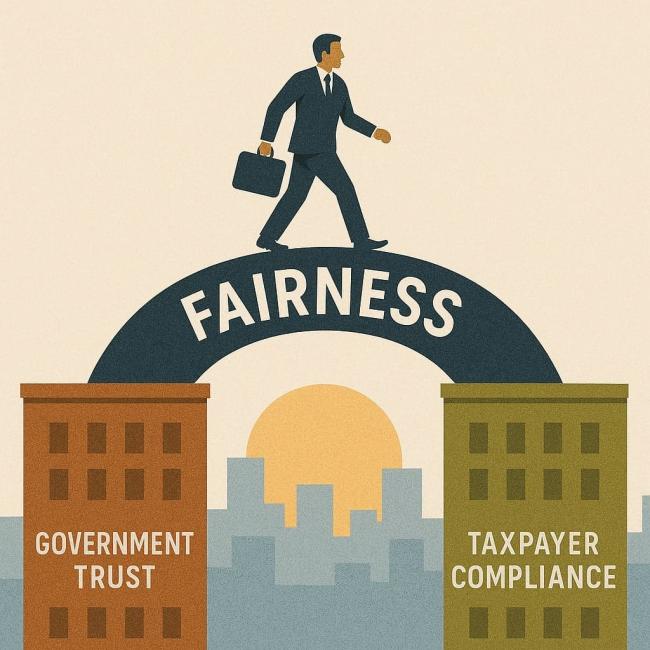Tax, Power, and The Making of The Ideal Citizen

Oleh: Lutfiya Tussifah, pegawai Direktorat Jenderal Pajak
Behind motivational slogans the like of “Proud to Be a Compliant Taxpayer”, lie rarely questioned premises: what does compliance truly mean in the context of taxation? Is it merely about fulfilling fiscal obligations according to the law, or is there any deeper ideological and political dimension underpinning it?
In modern tax governance, the label “compliant taxpayer” has evolved beyond a legal classification into a moral emblem. It represents not only those who pay taxes as required, but also an imagined ideal of the “good citizen.” This ideal, however, does not emerge out of the blue. As Michel Foucault would argue, no discourse is ever innocent. Each one is a product of historical struggle, deeply entangled with power and its reproduction.
Tax compliance, therefore, is not just a technical matter. It is a discursive formation—produced, normalized, and reinforced by governments, institutions, and even society at large. Through legislation, tax policies, public campaigns, and law enforcement practices, the state constructs a trustworthy regime in which compliance is not just legally right but morally righteous. The compliant taxpayer becomes a desirable subject: disciplined, responsible, and patriotic.
On the other hand, this discourse manufactures its own opposite: the non-compliant taxpayer, often imagined as deviant, selfish, or even criminal. Such binary constructions serve a disciplinary function. They do not merely inform citizens what they should do. They define what they should be. The logic of moral compliance infiltrates social norms, enabling the state to govern not just through coercion but through internalized expectations.
Such internalization reflects a deeper mechanism at play, where state narratives intersect with individuals’ self-perception. Foucault called this the “microphysics of power.” Power is not merely imposed from above; it also operates through everyday practices and social consciousness. People monitor themselves, not only to avoid sanctions but to feel that they are doing the “right” thing. Tax offices become sites not only of administration but of subject formation.
Power, in Foucault’s framework, is not only repressive, but also productive. It creates institutions, behaviors, and identities. In the case of taxation, fiscal power is exercised through multiple layers: legislation, executive policy, adjudication, digital surveillance, and self-reporting systems. Each mechanism may seem procedural on the surface, but collectively, they form a powerful apparatus for shaping civic life.
Still, subjects are never fully determined by discourse. Resistance, negotiation, and even quiet subversion persist. The rise of aggressive tax planning, offshore hiding of assets, and digital evasions are all forms of pushback against the dominant narrative of compliance. These are not merely economic acts. They are symbolic contests over who gets to define legitimacy.
Globalization and technological advancement have complicated this terrain further. Digital platforms enable individuals and corporations to obscure income across borders. The state, in its turn, responds with more surveillance, more regulation, and more persuasive rhetoric about fairness and national duty. However, the asymmetry remains. While the discourse promotes moral obligation, the structural capacity to comply is often unequally distributed.
This brings us to a fundamental question: does every taxpayer in Indonesia truly have the same opportunity to be compliant? Access to information, digital literacy, bureaucratic support, and economic resources all play a role in shaping one’s ability to meet tax obligations. For some, compliance is a smooth procedure. But for others, it is a bureaucratic maze or a financial impossibility. Nevertheless, the discourse seldom makes room for such nuance.
In Indonesia, where tax revenue is a vital pillar of the national budget, the state understandably encourages public participation through taxation. Independence from foreign aid, regional development, and public services all depend on sufficient fiscal intake. But when the appeal to compliance is wrapped in moral or patriotic language, it risks concealing systemic inequality.
We must therefore move beyond the binary of compliant versus non-compliant. A more reflective fiscal discourse would acknowledge the diversity of taxpayer experiences and question the power structures that define who counts as a “good” citizen. Taxation is not merely about revenue collection. It is about how the state sees its people, and how people are shaped in turn.
In rethinking the term compliant taxpayer, we begin to see that tax is never just a number. It is a narrative. And like all narratives, it deserves to be read critically.
*)This article represents the personal opinion of the author and does not reflect the official stance of the institution where the author works.
The content on this page may be copied and reused for non-commercial purposes. However, we kindly ask users to credit the source by linking back to the original page. Hope this helps.
- 291 views
